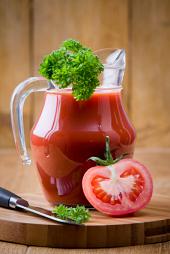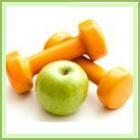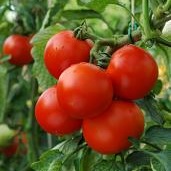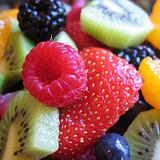Tomato Nutrition Facts,
Health Benefits of Tomatoes
All about tomato nutrition facts, health benefits of tomatoes and tomato juice, calories in tomatoes and tomato nutrients
Tomatoes contain one of the three best known sources of the antioxidant lycopene, a potent anti-cancer carotenoid, and a pigment that makes the tomato red. Together with the antioxidants, vitamin A, alpha and beta-carotene, tomatoes are thought to lower the cancer rates in the stomach, lung and prostate, following research when comparing two groups of tomato and non-tomato eaters.
They are also believed to reduce the incidence of bladder, pancreas and cervix cancers, as tomatoes are thought to help fight against rogue molecules that can cause cell damage.
According to the US nutritional database, tomatoes are very low in calories, approximately 18 calories per 100g, very low in fat and contain no cholesterol. Other benefits of tomatoes are thought to include a reduction in skin damage from the sun, thus slowing down the appearance of the aging process, and a reduced risk of cardiovascular diseases and osteoporosis. Tomatoes also contain lutein which is thought to slow the age related macular degeneration.
Sun-dried tomatoes are in effect, tomatoes that have been allowed to dry out. Tomatoes are approximately 90-95% water, and the process of drying them removes most of the water, whilst still retaining their nutrients.
Tomato nutrients are thought to be at their highest concentration when cooked. If you have children and they refuse to eat tomatoes, then ketchup is a good substitute.
Compare tomato nutrition facts to the other fruits.
 |
 |
Nutritional Value of Tomatoes
Select the item in the drop down menu and click on the “click here” button to see cherry tomato, green tomato, yellow tomato, orange tomato and sun-dried tomato nutrition facts.
| Tomato nutrition facts per 100 g (3.5 oz) Scientific Name: Lycopersicon esculentum |
||
|---|---|---|
| Proximates: | ||
| Nutrients | Tomatoes, red, ripe, raw, year round average Refuse: 9% (Core and stem ends) | Tomato juice, canned, with salt added |
| Water | 94.52 g | 93.90 g |
| Energy | 74 kJ (18 kcal) | 73 kJ (17 kcal) |
| Protein | 0.88 g | 0.76 g |
| Carbohydrates | 3.89 g | 4.24 g |
| Fiber | 1.2 g | 0.4 g |
| Total Fat: | 0.20 g | 0.05 g |
| Cholesterol | 0 mg | 0 mg |
| Minerals: | ||
| Calcium, Ca | 10 mg (1 %) | 10 mg (1%) |
| Iron, Fe | 0.27 mg (1.5 %) | 0.43 mg (2%) |
| Magnesium, Mg | 11 mg (3 %) | 11 mg (3%) |
| Phosphorus, P | 24 mg (2.4 %) | 18 mg (2%) |
| Potassium, K | 237 mg (5 %) | 229 mg (7%) |
| Sodium, Na | 5 mg (0.2 %) | 269 mg (11%) |
| Zinc, Zn | 0.17 mg (1 %) | 0.15 mg (1%) |
| Copper, Cu | 0.059 mg (3 %) | 0.061 mg (3%) |
| Manganese, Mn | 0.114 mg (6 %) | 0.070 mg (4%) |
| Vitamins: | ||
| Vitamin C | 13.7 mg (23 %) | 18.3 mg (31%) |
| Thiamine (Vit. B1) | 0.037 mg (2.5 %) | 0.047 mg (3%) |
| Riboflavin (Vit. B2) | 0.019 mg (1 %) | 0.031 mg (2%) |
| Niacin (Vit. B3) | 0.594 mg (3 %) | 0.673 mg (3%) |
| Pantothenic acid (B5) | 0.089 mg (1 %) | 0.250 mg (3%) |
| Vitamin B6 | 0.080 mg (4 %) | 0.111 mg (6%) |
| Folate (Vit. B9) | 15 mcg (4 %) | 20 mg (5%) |
| Vitamin A | 833 IU (17 %) | 450 IU (9%) |
| Vitamin E | 0.54 mg (3 %) | 0.32 mg (2%) |
| Vitamin K | 7.9 mcg (10 %) | 2.3 mcg (3%) |
| Percentages are relative to US Recommended Daily Intake (RDI) for adults. | ||
Author: Lana Soko
You Might Also Like:
Like This Page?
|
Share This Page:
|
Search Our Site:

Free E-Book:
We Recommend:
Looking to get your body into great shape? Get the very best results for your efforts and money! Save your valuable time from surfing the internet. These are theBestselling Weight Loss Programs

Programs that work and have thousands of satisfied customers worldwide!

 |




